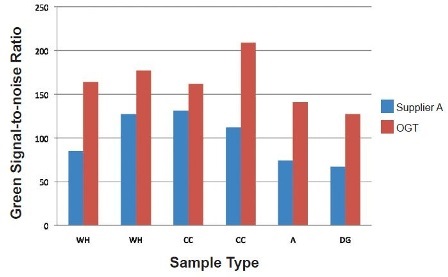Application note reveals superior performance of CytoSure Genomic DNA Labelling Kit
Oxford Gene Technology (OGT), The Molecular Genetics Company, has released a new application note detailing the technical evaluation of two DNA labelling kits, where OGT’s CytoSure Genomic DNA Labelling Kits were found to be quicker and more accurate than a leading alternative. Achieving efficient and uniform labelling of both test and reference DNA samples is critical for aCGH studies, enhancing data accuracy and interpretation. By ensuring greater accuracy, OGT’s kits vastly improve the identification of breakpoints and even the smallest aberrations, providing robust and invaluable insights into the underlying cause of genetic disorders.
During the evaluation, performance was judged on two key quality control metrics of the microarray: the derivative log ratio spread (DLRS), which calculates the probe-to-probe ‘noise’ and thereby indicates the uniformity and accuracy of labelling; and the signal-to-noise ratio, which indicates how accurately each ‘spot’ of signal can be detected. The application note details how, using commercially available DNA samples, CytoSure Genomic DNA Labelling Kits consistently generated both a lower DLRS (below 0.2) and higher signal-to-noise ratio (above 100), compared to the alternative supplier. OGT’s kits also undergo stringent quality control monitoring for every reagent batch to ensure reliable the delivery of such high quality results for every experiment.
CytoSure Genomic DNA Labelling Kits utilise heat rather than restriction enzymes to fragment the DNA samples, thereby streamlining the workflow and reducing loss off material. Removing the restriction digest stage saves approximately two hours, allowing the whole procedure to be easily completed in a single day.
These evidence-based findings from OGT highlight the superior performance of CytoSure Genomic DNA Labelling Kits, and this conclusion is also supported by extensive customer evaluations. The Cytogenetics Laboratory, Baylor College of Medicine, commented: “Our lab has tried a variety of different labelling methods and found OGT’s CytoSure Genomic DNA Labelling Kit to give consistently low DLRS values and excellent signal-to-noise ratios.”